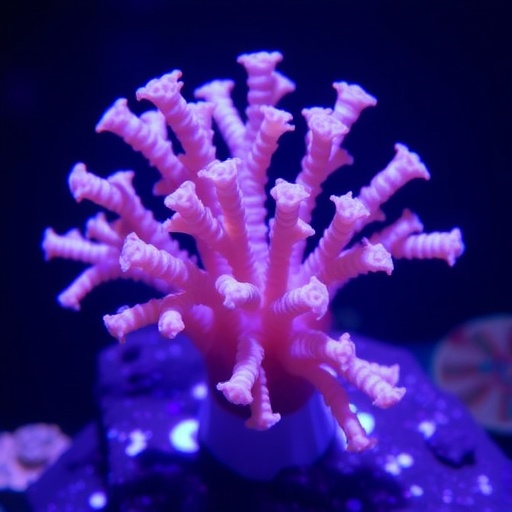In a groundbreaking study recently published in the renowned journal Coral Reefs, researchers have delved into the fascinating world of Acropora aff. tenuis corals, revealing previously unknown aspects of their reproductive behavior. This in-depth investigation demonstrates how these corals, part of the broader Acropora genus, strategically release bundles of gametes into their surrounding environment. The findings of this research not only expand our understanding of coral biology but also underscore the ecological significance of these processes in marine ecosystems.
The study emphasizes the intricacies involved in the reproductive cycle of Acropora aff. tenuis. An essential part of their reproductive strategy involves synchronized bundle release, ensuring the maximization of gamete fertilization in the wild. This phenomenon is crucial for maintaining the genetic diversity of coral populations, which is vital for their resilience and adaptability to changing environmental conditions, including climate change and pollution.
Through meticulous field studies, the researchers observed the timing of these bundle releases, identifying specific environmental cues that trigger this critical reproductive event. Factors such as water temperature, lunar cycles, and even local biological interactions were carefully cataloged, offering a comprehensive overview of what external elements influence the duration and success of gamete release in these corals.
Acropora corals are particularly noteworthy due to their role as foundational species in reef ecosystems. By forming complex structures that provide habitats for numerous marine organisms, they are central to the biodiversity of coral reefs. Therefore, understanding their reproductive patterns not only aids in coral conservation efforts but also informs strategies aimed at mitigating the impacts of environmental stressors on these essential marine environments.
The duration of gamete bundle release among Acropora aff. tenuis corals was meticulously quantified in this study. By deploying innovative monitoring techniques and utilizing real-time observational methods, the researchers obtained unprecedented data on the timing and efficiency of reproductive output. The results illustrate how adaptations in bundle release length can influence the overall reproductive success of coral populations, further elucidating the interconnectedness of environmental condition and reproductive strategy.
Moreover, their results challenge previous assumptions about coral reproduction. Many researchers previously believed that the timing of gamete release was relatively inflexible. However, the findings presented in this study suggest that Acropora aff. tenuis corals can adjust their reproductive behavior adaptively in response to fluctuating environmental conditions. This remarkable adaptability raises vital questions about the evolutionary pathways these corals might pursue in the face of rapid climatic shifts.
The ecological ramifications of this research are profound. As climate change continues to impact marine environments, understanding the mechanisms that underpin successful coral reproduction becomes increasingly urgent. The adaptive mechanisms revealed through the study of Acropora aff. tenuis may hold key insights into how other coral species might respond to environmental stresses. The survival of coral reefs, which are some of the world’s most biodiverse ecosystems, hinges on such adaptability.
In addition to contributing to the scientific community’s knowledge about coral reproduction, the researchers highlight the role of citizen science in their work. Engaging local communities and divers, the study leveraged observations from non-experts to supplement their data collection efforts. This collaborative approach not only enriches scientific research but also fosters greater awareness and involvement among the public regarding the challenges faced by coral ecosystems.
Furthermore, the study employs advanced statistical models to analyze data, ensuring the robustness of the findings. By utilizing these sophisticated approaches, the researchers provide a nuanced understanding of reproductive trends over time. Understanding how various environmental conditions influence coral reproduction can help inform future conservation strategies and management practices aimed at protecting vulnerable reef ecosystems.
This investigation serves as a clarion call to prioritize the conservation of coral reefs in the light of this new knowledge. Conservation efforts grounded in scientific understanding, such as this study on Acropora aff. tenuis, can be pivotal for the preservation and health of global marine biodiversity. The urgency for policy change and protective measures is underscored as the effects of climate change on corals become increasingly palpable across the globe.
Coral reefs are not just breathtaking natural wonders; they are critical indicators of ocean health. In the wake of ongoing environmental degradation, studies like this one highlight the necessity of understanding and supporting the reproductive strategies of corals. Efforts to maintain genetic diversity through effective conservation practices are essential for the long-term survival of different coral species.
As the research community further investigates the intricacies of coral reproduction, the hope is that the insights gained can be translated into actionable management strategies. By focusing on the physiological and environmental variables influencing reproductive success, scientists can better predict the future of coral populations in a rapidly changing world. This study leads the way in illustrating the importance of interdisciplinary approaches to coral conservation—melding biological sciences with ecological management and community engagement.
In conclusion, the detailed and comprehensive exploration of the bundle release duration by Acropora aff. tenuis corals represents a significant advancement in our understanding of coral reproduction. By promoting a greater understanding of these processes, scientists aim to foster resilient marine ecosystems. Continued research in this field will undoubtedly unveil further complexities, catalyzing urgent action needed to protect the vital ecosystems coral reefs represent. This research is a pivotal step not only for coral science but also for the broader implications it has on ocean conservation efforts.
Subject of Research: Coral reproductive behavior and ecology of Acropora aff. tenuis.
Article Title: Duration of bundle release by Acropora aff. tenuis corals in the field.
Article References:
Suzuki, G., Tashiro, S., Suhara, Y. et al. Duration of bundle release by Acropora aff. tenuis corals in the field.
Coral Reefs (2025). https://doi.org/10.1007/s00338-025-02754-2
Image Credits: AI Generated
DOI: 10.1007/s00338-025-02754-2
Keywords: Acropora, coral reproduction, marine biology, climate change, ecological significance, conservation strategies.




